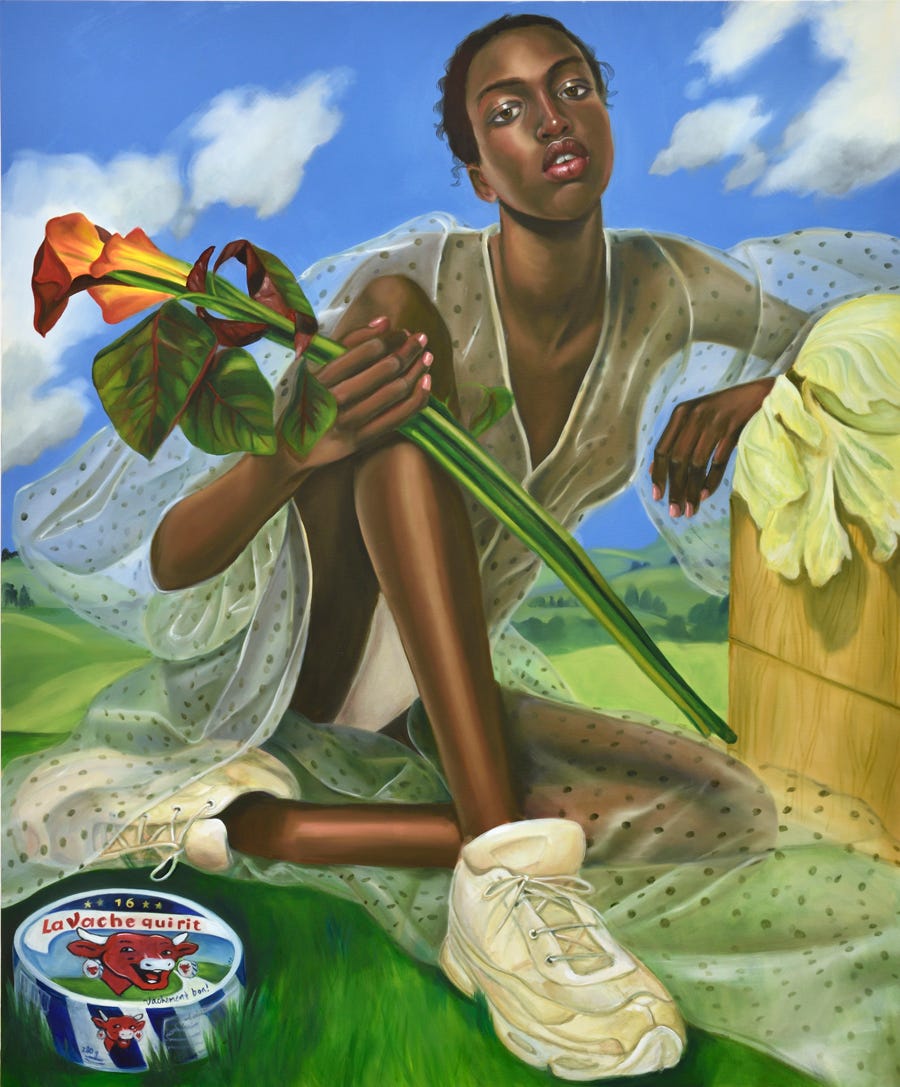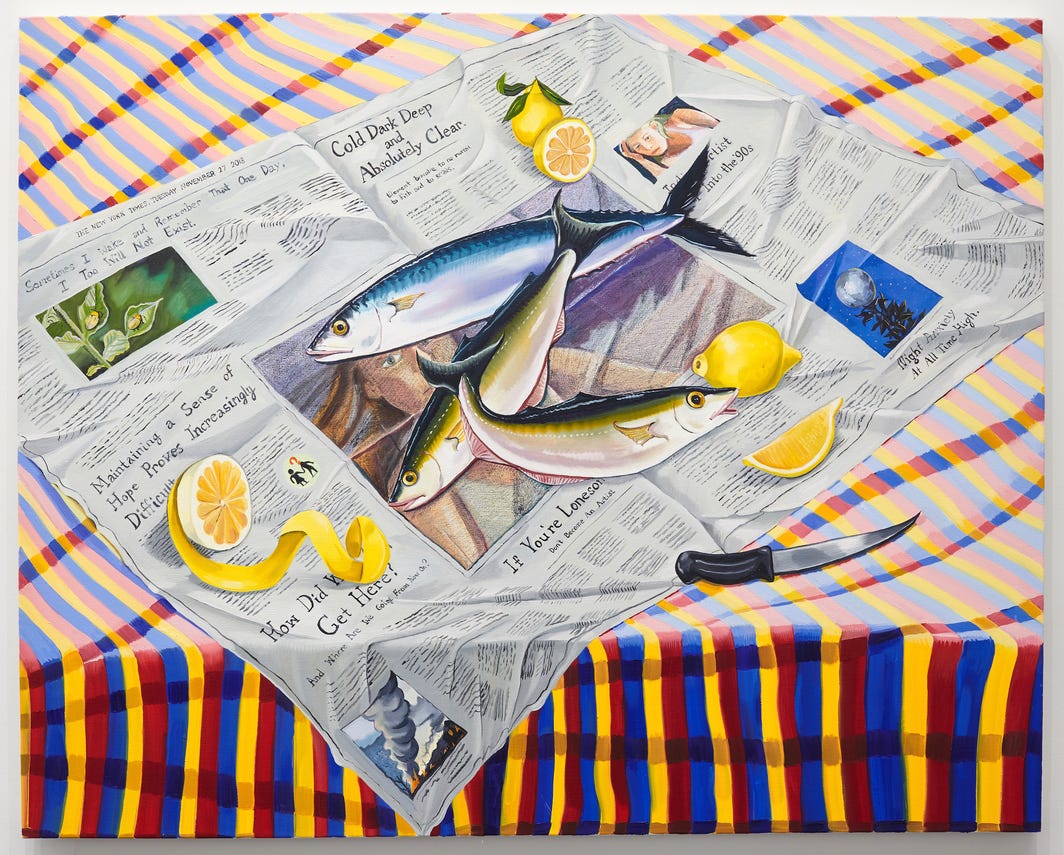Want to play a game? The rules are rather simple. In a sentence, have a friend outline a fictional scenario in which you meet your perfect match. There is, of course, a twist. In addition to presenting you with your ideal partner, your friend must detail one unchangeable ‘hitch.’
It may start off small… “Perfect for you but you work with them.”
But it will likely snowball toward the extreme… “Perfect for you but they’ve committed vehicular manslaughter.”
If you accept the hitch, you answer “perfect for me” and if it’s a deal breaker, you respond “not perfect for me.”
What is positioned as a game of romantic possibility quickly becomes a test of limits where you amp up the hitch to gauge your peers’ boundaries and values. It’s difficult to discern if you’re detecting desperation in your friends' answers or sussing out which ones are just die-hard romantics. Perhaps there isn’t much of a difference between the two.
During a balmy Brooklyn night, a few friends and I were playing such a game at a bar patio. All experienced players of this game and others, our hitches began in the most obscene territory: “Perfect for you but they have one big nostril instead of two and snot constantly drips out.”
Amused, we sipped our beverages and debated our differing viewpoints. More scenarios with intense hitches were tossed and toiled, generating spirited yet divided responses. Eventually, I proposed a scenario that prompted a unanimous answer:
“Perfect for you but they will die in five years.”
An unflinching “perfect for me” answered back.
Startled by their quickness, I adjusted the constraint. “Perfect for you but they die in two years.”
“Perfect for me.”
“In six months.”
“Perfect for me.”
It was uncanny for a group of chaotic individuals to possess a stroke of cohesion. An uproarious affinity for non-commitment flings had been located! Before we could explain ourselves, a distant acquaintance broke into our discussion and moved the conversation beyond our silly game. We made small talk with the new entrant but, internally, a quiet consensus migrated between us. A new understanding had been surmounted, one where we agreed that it was better to experience something beautiful, no matter how fleeting. No matter how it leaves you. Regardless if it will die.
Entire economies are established on the premise that there is value in relishing in something that eventually will die. The historic flower market in New York’s Chelsea neighbourhood is one of these economies.
Each day, twenty tons of flowers are imported from Colombia, the Netherlands and California to be sold on 28th Street. A fresh and fully bloomed Bogotano carnation is plucked in the morning. Soon enough, the carnation will find itself delicately cocooned in a hydrated substance to preserve its moisture as it voyages into PortMiami, the country’s largest destination for cut flowers. Once cleared of pests and diseases by U.S. customs and equipped with a newly minted workers’ visa, the carnation boards a truck and hitches a ride to New York. There, in the Chelsea flower market, it will be selected by a New Yorker for purchase. The entire odyssey could take between three days to three weeks. A gargantuan effort pursued just for the carnation to die basking in a vase by the sink or amongst distant relatives in a wedding floral arrangement. Such are the lengths for beauty.
The idea of loving something that will eventually leave you isn’t novel. In fact, there are a lot of things that we cherish on the sheer basis that they will leave us. Although this is not a newsletter primarily concerned with economics, I have it on good authority that scarcity increases value. Summer is one of these things. When it approaches, you believe you ought to maximize every night before it slips away like a bottle of wine.
“Come on, it’s summer!” is one of my favourite pleas when pressuring a friend to do something they probably shouldn’t. Something that definitely won’t pay off in the long term. The irony of this tension is that within summer lies a cacophony of experiences that we invest in despite their brevity. Summer break, summer flings and summer bodies come to mind. None of these will be present by the time the leaves fall but for some reason, during this tight string of months, we ignore our judgement (and bank accounts) and leap without looking. The ephemerality of summer evokes a false sense of impermanence for your actions. And, before we know it, it’s over and done with like a dozy beach read. Some of the books we will remember but most of them we won’t. Soon, we will observe summer in the rearview and recognize it as an opaque mirage of memories rather than a clear collection of isolated events. But despite how short-lived and transient, we must endure the summer in order to receive the fall.
What are we to do with these fickle acts of joy? These micro-moments that leave as soon as the possibility of love enters the room? Most of these experiences we forget. Encounters that felt so pressing to me last summer, individuals who could have been in my life forever, barely make the “previously on Brendon’s life” recap the following year.
But even when a flower dies, its smell lingers in your house. The flower petals you once loved lay like morsels on the floor. They cling to the floor panels under the couch that you sit on every day. And, as days turn to decades, you notice that you’ve made a rose garden out of your little seedlings of experiences. You’ve never noticed but the smell has always been pungent.
The work of Fiona Apple consistently moves me. How her words can mean one thing to me and reveal itself to be something completely different a year later. Lately, I have been revisiting the opening song of Fetch The Bolt Cutters to help decipher the significance of these seemingly unimportant micro-moments that lay the brickwork in our life’s path. In precise prose, supported by a wandering piano, she begins:
“I’ve waited many years / every print I left upon the track has led me here.”
Apple, with some distance from the dead things she once loved, has emerged with a greater perspective. She’s made sense of the hitches, the summer flings and the dying flowers and anoints them as essential components of her present. As Apple approaches the chorus, she leaps toward the future.
“And next year, it will be clear / this was only leading me to that / and by that time I hope that you love me.”
Apple acknowledges that these past experiences were necessary for her to attain the future she has envisioned for herself, one with the promise of love. There is a hint of eureka! in the timbre of her voice as if the jumbled misunderstandings of her life have finally revealed themselves to be a beautiful mosaic. As if she’s a few letters away from solving a category on The Wheel of Fortune. For Apple, the “perfect for yous” with hitches too obscene to surmount were critical steps toward her most ideal future.
Every time I listen to the song, I hear something else. I wonder what I will hear next year.
A day or so after the game on the patio, the troupe and I found ourselves on a roof in Brooklyn. When the sky cried fire, our necks were peeled upwards. Golden dandelions quickly sprouted and fell before our eyes and camera lenses. Their various petals burned out as fast as they bloomed, leaving behind wisps of smoke as proof of their existence. They were loud and mighty and frightening, much brighter than that Katy Perry song. The city must have spent a fortune to light up the Hudson for the hour, such commitment to a beauty that could only come alive to then die in front of us. A thousand floral funerals on the fourth of July, a fiery eulogy in the sky.
It was perfect for us but the spark left as quickly as it came. We mentioned the fireworks for a day or two and then never again. I haven’t returned to the photos I took on my phone of the sky that evening nor have I looked at the images from last year. But next year, I will gaze at the same sky to witness a flock of fiery flings on their way to being snuffed out. Unclear of what the future holds but certain that I couldn’t have made it to the present without the flames of the summer prior.










